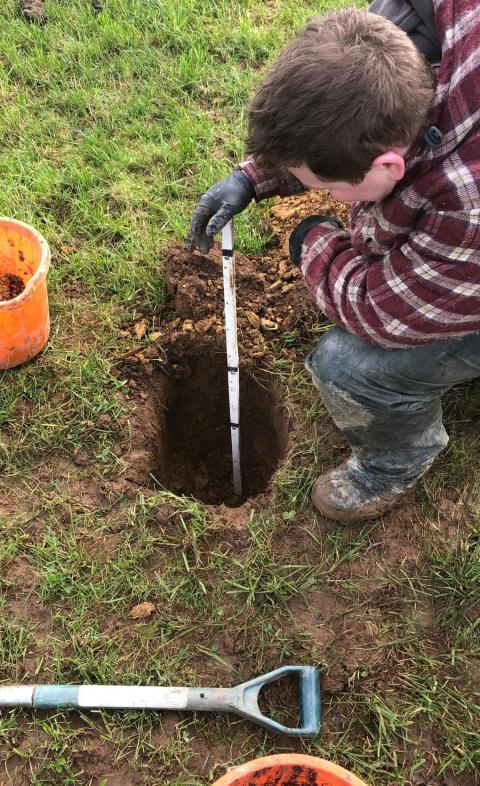19 July 2022
Farmers will have access to important pan-Wales soil carbon benchmarking data for the first time, thanks to an ambitious new Farming Connect auditing initiative.
The initial results of the Welsh Soil Project are being shared with farmers on the Farming Connect stand at the 2022 Royal Welsh Show – and they will be encouraged to get involved too, through free Soil Clinics.
The Welsh Soil Project has collected 1420 soil samples taken from the 17 Farming Connect red meat and dairy demonstration farms to establish organic matter and bulk density.
All samples were collected across within the same 14-day period in February, for uniformity, and from fields managed under different conditions – including permanent pasture, hay or silage, reseeds and grazing.
Soil was taken from multiple depths, from the top 10cm layer to as deep as 30-50cm.
Some of the results are now available, and show how soil carbon stocks vary according to field use.
Soil organic matter content is highest in the top 10cm (as high as 10.4% in the permanent
pasture), and decreasing deeper into the soil; it ranges from 8.5% in the fields cut for
forage to 10.2% in the top 10cm in the grazing-only fields.
The results were converted to Soil Organic Carbon, the main constituent of soil organic matter; used together with bulk density data (the weight of dry soil within a known volume), the carbon stock of the sampled soils could be estimated.
These ranged from 33.1t/ha in the top layer of the grazing-only field to 30.6t/ha in the silaging field.
Menna Williams, Farming Connect’s Red Meat Technical Officer, who is leading the project with Non Williams, says it is the first time pan-Wales benchmarking figures on this scale have been collated. She explained how this data will be useful for agriculture.
“Finding out today’s soil carbon levels will help benchmark against any changes in soil management.
“Methods of increasing carbon sequestration and storage in soils, by enhancing organic matter, and therefore, soil organic carbon, can reduce the amount of greenhouse gases in the atmosphere, but may also provide additional benefits to landowners, such as improved soil quality and fertility, reduced compaction, erosion and nutrient loss.’’
Healthy soils can store more carbon, the main component of soil organic matter, which helps with its water-retention capacity, structure and fertility.
Soil carbon data is also needed when undertaking a Farm Carbon calculator, Ms Williams points out. Knowing a farm’s carbon soil content will strengthen the results, she adds; it will also show where improvements are needed.
Other farmers can get involved, as Farming Connect is currently offering free Soil Clinics to analyse soils and provide farmers with a soil carbon audit.
As well as discussing the results of the Welsh Soil Project with the Farming Connect team at the Royal Welsh Show, farmers will be shown how a simple experiment involving burying cotton material can help them learn about the state of their soil.
Farming Connect is at the Lantra Wales building on the Royal Welsh Showground, located opposite the Wales YFC centre.
Farming Connect is delivered by Menter a Busnes and Lantra Wales and funded by the Welsh Government and the European Agricultural Fund for Rural Development.

